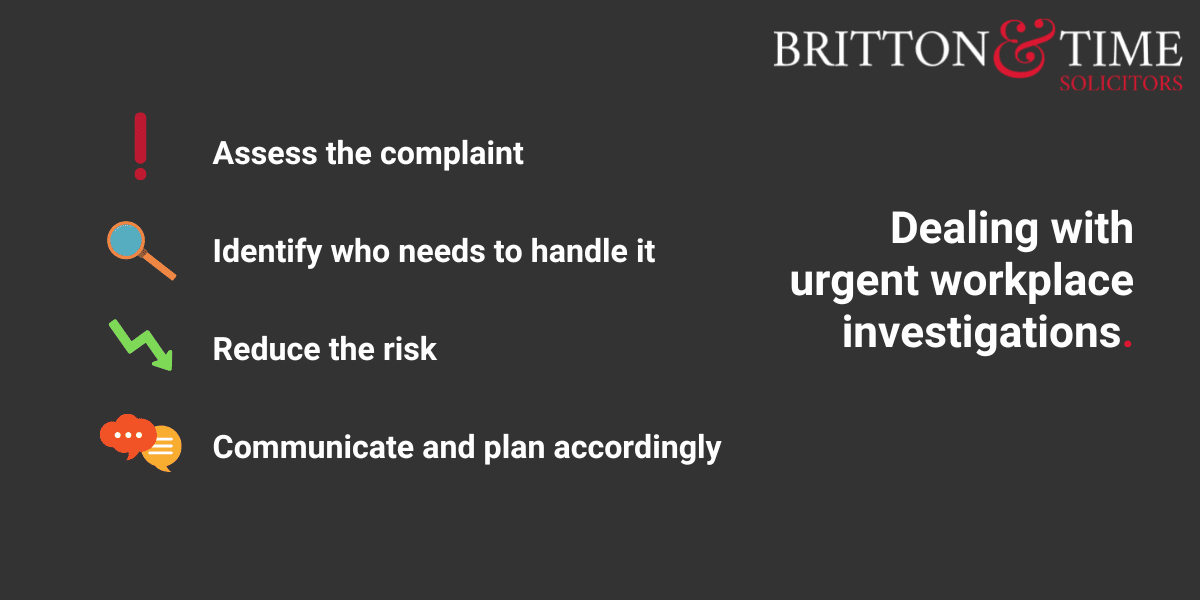Of all the employment-related instructions I get at Britton and Time Solicitors, whether in Mayfair or Brighton, the most common would be how to run a decent workplace investigation. Specifically, one that removes the risk of litigation and draws the attention of an employment tribunal.
As much as I can deal with this sort of instruction, I usually go further and advise my clients on long-term cultural change within their business to stop any further complaints arising. As many of my clients already know, a negative culture followed by a poor workplace investigation will likely cause more problems than it sets out to solve.
1. Urgency.
When I advise on workplace investigations, I first ask clients to consider the complaint. Are there any issues that relate to regulatory, compliance or online security? Is the complaint alleging criminality?
If the answer to these questions is yes, then there may be some business urgency to act quickly and give your lawyers the heads up.
I encourage clients to identify anyone who may be vulnerable or at risk from, or concerning, the complaint at an early opportunity. If so, you should contact them to ensure they are safe.
In my experience in employment litigation, employers often fail to identify the person who should handle complaints soon enough. It can take employers a week or two just to figure out who is going to deal with responding to the complainant. This leaves the complainant totally in the dark, interpreting it as the employer not caring or thinking that nothing is going to happen.
In cases like this, I advise clients to be ready, just in case the complaint boils over into something more serious.

For prudent employers who like to get their affairs in order sooner rather than later, I’ll draft documents, guidance and policies that clearly identify whose desk the complaint should land. If there was any uncertainty before, it will outline who is ultimately going to deal with it.
For those who like to react rather than prepare, I’m normally on hand to draft letters, assess the situation and get my head about the internal organisation structure. This way, I can place the employer in the best possible position before hitting the complaint itself head-on.
A conversation will need to be had with senior management to identify who to speak to and formulate a good understanding of what’s happened, if anything at all. In some cases, the list of people you are not going to talk to might be more important, as you do not want the complainant stating that you deliberately did not speak to a key person.
In summary, to respond to a claim, you should:
- Assess
- Identify
- Reduce risk
- Communicate and plan
2. Maintain independence during a workplace investigation.
I will often be asked by clients if they should get an outside investigator in to deal with the complaint. Here, my advice will depend on the complaint itself.
If the allegations are directed at a CEO, director level or even a senior member of staff, alongside the complaint being serious or sensitive, then the advice will usually be to find an independent investigator from outside the organisation.
Complainants can sometimes feel better when they know an independent person is going to look at the complaint. However, workplace investigations can face delays while you source an external person. Ensure that you regularly update the complainant with any major updates.
 Furthermore, you might want to give them some input into who investigates. You may achieve a faster investigation internally but be sure to get the approval of the complainant where possible to prevent any future claims of lack of impartiality.
Furthermore, you might want to give them some input into who investigates. You may achieve a faster investigation internally but be sure to get the approval of the complainant where possible to prevent any future claims of lack of impartiality.
If you require a disciplinary process after a workplace investigation, it is important to only appoint one HR director or another director to conduct it. This is because there might be appeals to the outcome and you will need other senior staff available to undertake the appeal stage.
If you have a regular law firm, you might want to consider instructing a new and independent firm to avoid allegations of bias. If you do go with your regular firm, perhaps think about a solicitor within that firm whom you do not have a close relationship with.
Similarly, think about someone who does not share office space with your usual lawyer. This will help to maintain the integrity of the investigation.
3. Keep it real.
Complainants often demand that they remain anonymous when they make a formal complaint. The advice to my employer clients is not to make any promises or give reassurances of either namelessness or confidentiality. Although they might try to keep it a secret, the reality of most workplaces is that news travels fast.
Another point to consider is the nature of the allegation. Let’s say it is one of criminality, such as racial discrimination or sexual misconduct. There’s no way to investigate this properly without knowing:
- what is said to have transpired;
- the identity of the victim
In some cases, I may advise an employer to separate the investigation into a fact finder, who will report on the findings they make. They can then separately task a more qualified individual to make changes or deliver recommendation on how to resolve the complaint.
You should handle recommendation internally, as your own members of staff will have a good understanding of what is and is not possible.
4. Take responsibility for a workplace investigation.
I often find myself making the point to my clients that although, in many cases, they can seek assistance from external professionals, they cannot simply “farm out” a solution.
When clients get an investigator’s outcome, they sometimes ask if they can withhold them from the complainant or hide some of the recommendations.
The answer is “probably”, but I wouldn’t recommend it.
The complainant might have done you a favour by bringing the issues to your attention and save you potentially thousands of pounds.
With more topic complaints about, race, sex, environment or security, the client will want to avoid reputational damage if they try to hide it.
It’s very easy to publicise mismanagement to the world which, despite quickly using injunctions, can cause irreparable damage!
5. Double-check everything.
You should check over any written correspondence again, again and again. One poorly constructed sentence, paragraph or inappropriate word could undermine the entire process.
Outcomes should read like a book and tell the story in a nice chronological order. This way, anyone who reads it in the future can quickly understand the details, like the when, the where and the who.
It’s best to deal with absolutely everything relevant. Don’t leave something out because you think “it’s not important” or that you think it’s no longer an issue.
6. Have regular reviews about workplace investigations.
 Once it’s all in the past and you think its “gone away,” think again.
Once it’s all in the past and you think its “gone away,” think again.
Do you need a review? Did someone implement all of the recommendations? Are they working? Should you approach the original complainant and pre-empt any further complaints that could be costly or time-consuming? Instead, you could have a simple and relatively short review.
Consider the company culture and conduct a review. Is it working? Are your employees happy and productive in the current environment? Are the opinions and moods of the larger workforce now different? Do you think you’re remaining competitive as an employer?
Naturally, these questions and the answers will differ from industry to industry and the scale of your business. But it only takes a moment to consider and start a review which, in the long run, may save you time and money. On top of this, it may give you possible defences if an Employment Tribunal case emerges in the future.
7. Treat others how you would want them to treat you.
Put yourself in their shoes: if you were to raise a grievance, you would want updates about the workplace investigation. However, you must balance that with all your employees needs by keeping them all up to date throughout the process.
As an expert employment solicitor, I always advise my clients to treat people with compassion, empathy and above all serenity throughout the process.
What I don’t want my clients to do is to conduct the investigation and then never speak to anyone again.
Regular feedback and keeping everyone up to date in the process is important to give staff a sense of belonging which, in term, promotes good mental health and productivity in the workplace.











Leave a comment Your email address will not be published.